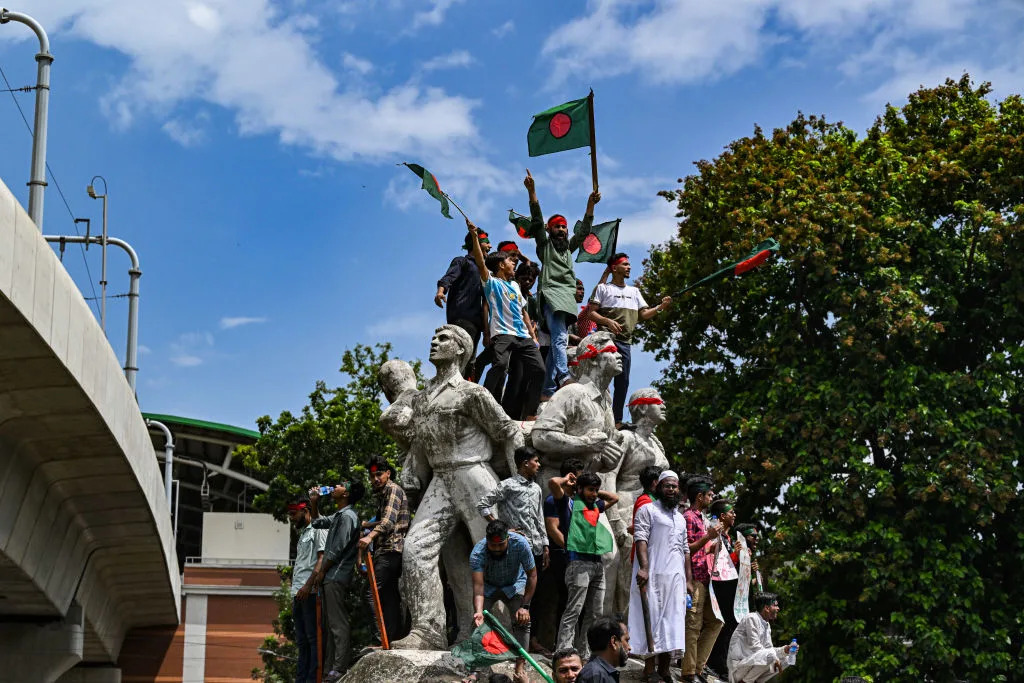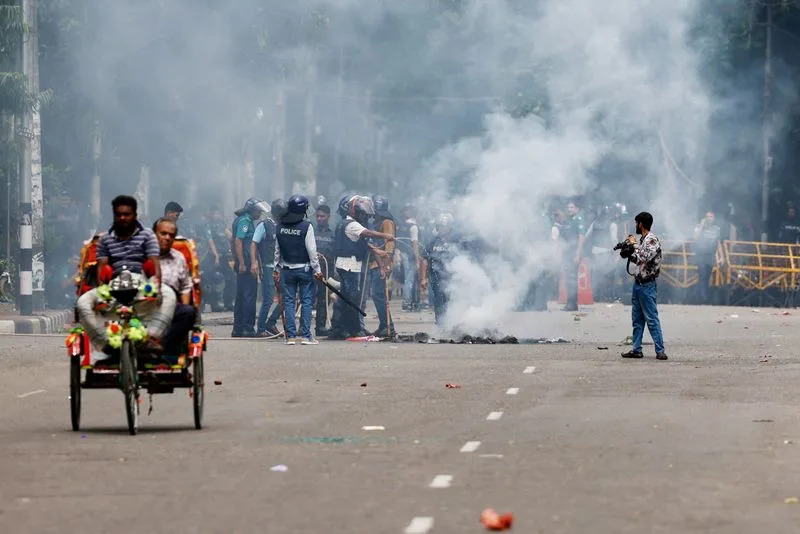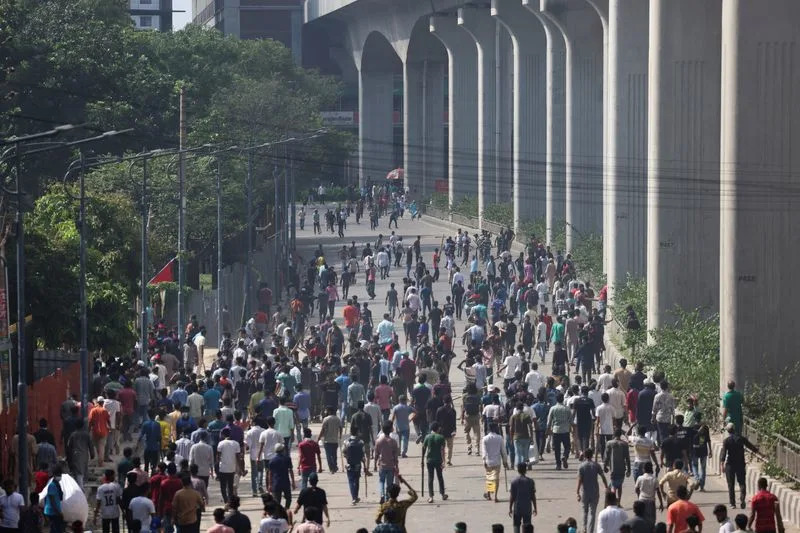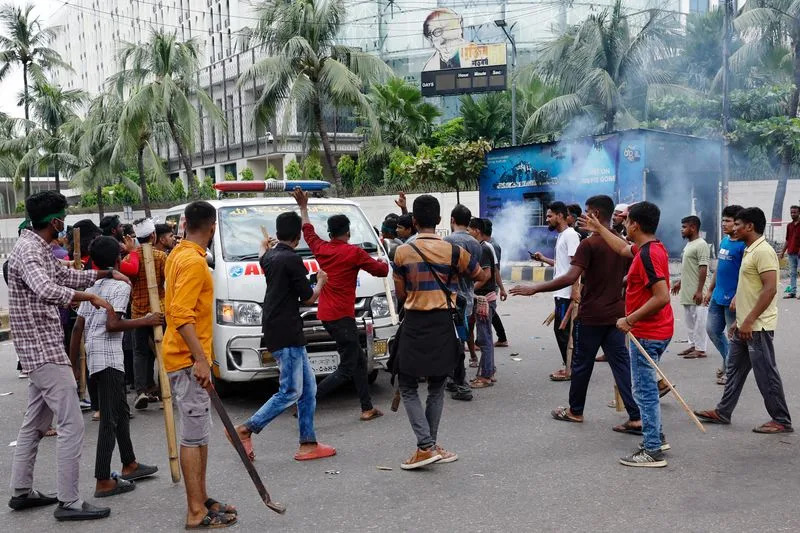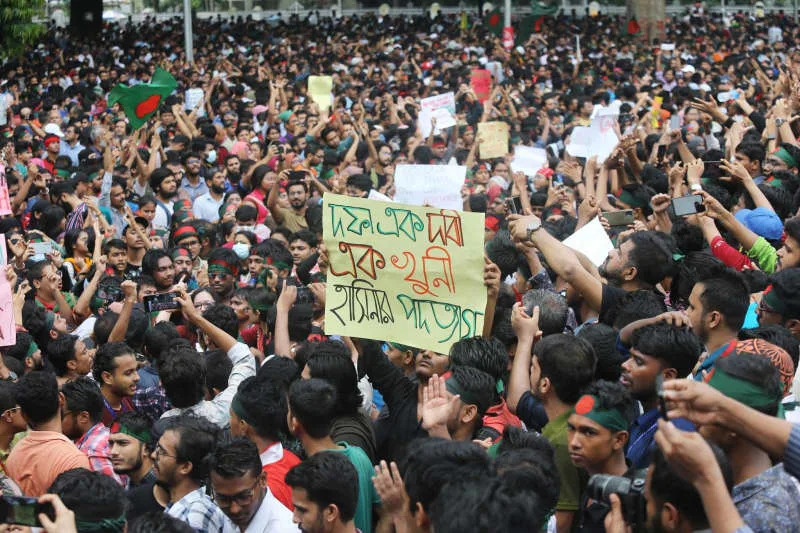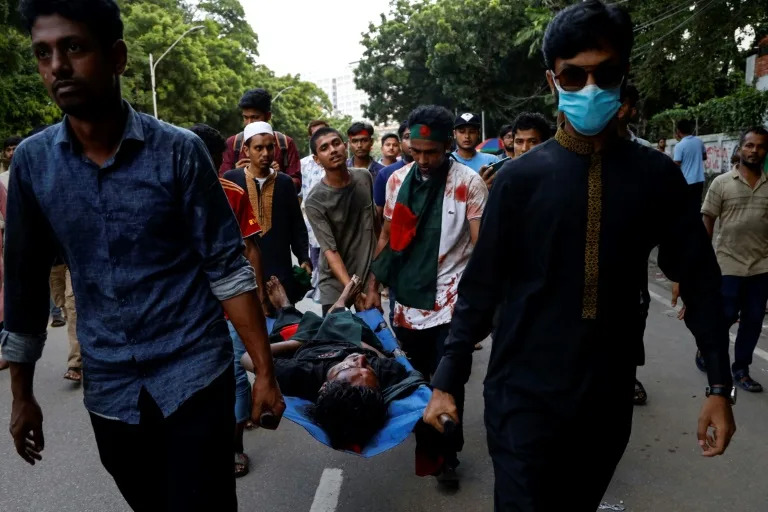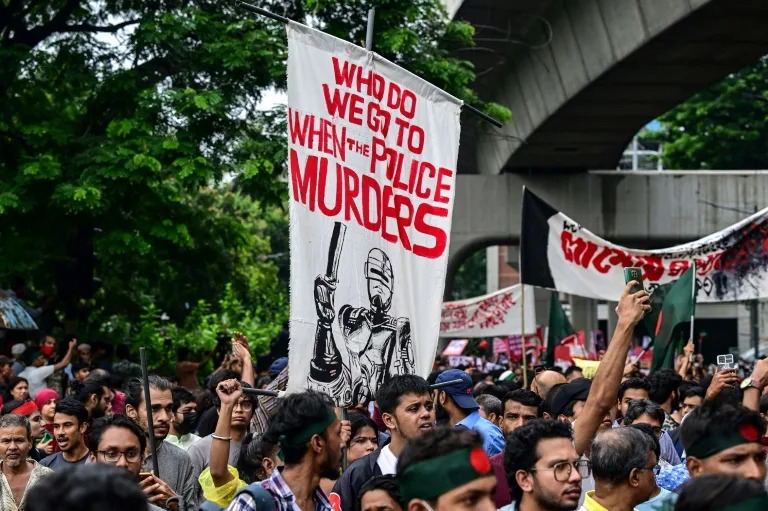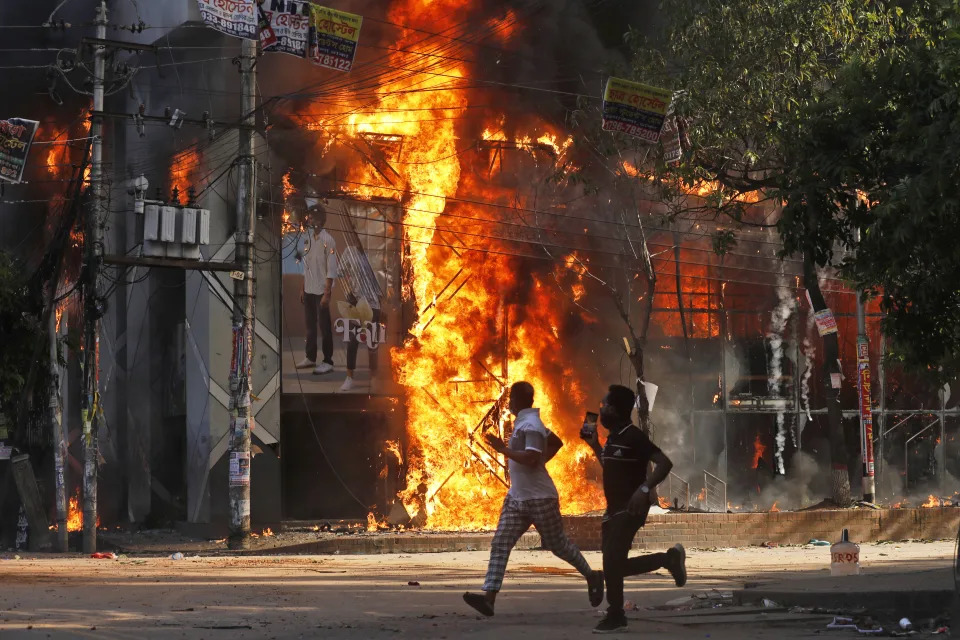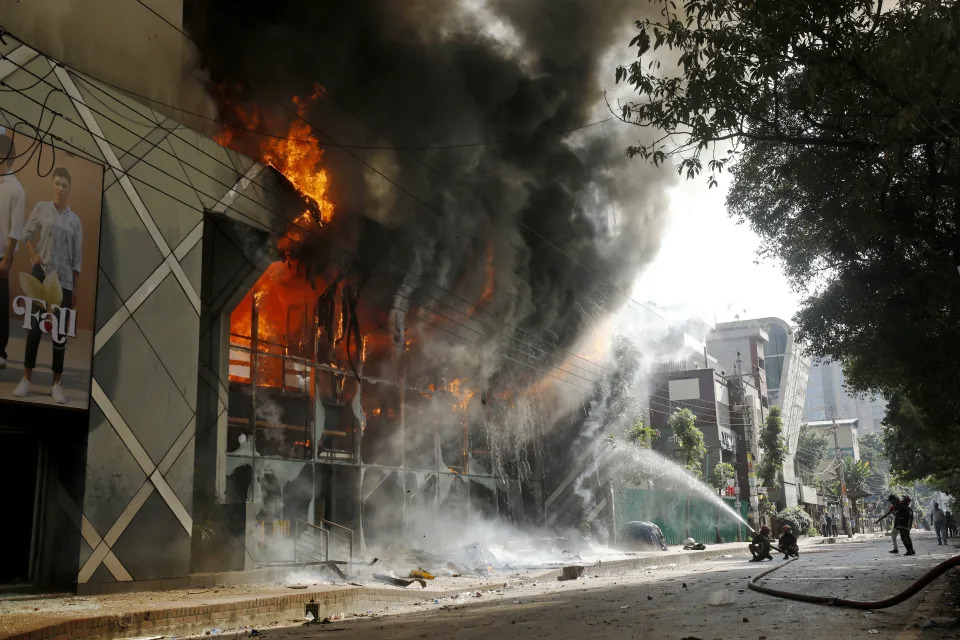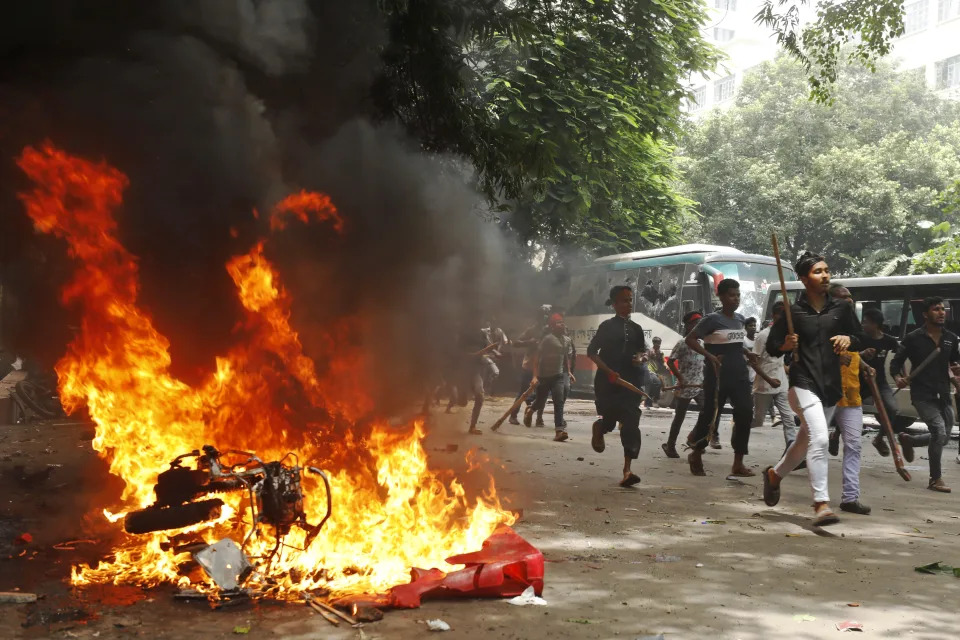Mon, August 5, 2024

Soldiers and police with armoured vehicles in Dhaka barricaded routes to Hasina's office with barbed wire in a bid to enforce a curfew but protesters still marched on the streets (Munir UZ ZAMAN)
Bangladeshi Prime Minister Sheikh Hasina's 15-year rule ended on Monday as she fled weeks of deadly protests and the military announced it would form an interim government.
Hasina had sought since early July to quell nationwide protests against her government but she fled after a brutal day of unrest on Sunday in which nearly 100 people were killed.
Bangladesh's army chief General Waker-Uz-Zaman said in a broadcast to the nation on state television on Monday Hasina had resigned and the military would form an interim government.
"The country has suffered a lot, the economy has been hit, many people have been killed -- it is time to stop the violence," Waker said, dressed in military fatigues.
"I hope after my speech, the situation will improve," he said.
The career infantryman said he would talk to the president to form a caretaker government in the South Asian nation of some 170 million people. It was not immediately clear if he would lead it.
Waker said he had held talks with the main opposition parties and civil society members but not Hasina's Awami League.
Hasina, 76, fled the country by helicopter, a source close to the leader told AFP shortly after protesters had stormed her palace in Dhaka.
The source said she left first by motorcade but was then flown out, without giving her destination.
- 'Major vacuum' -
Jubilant crowds had waved flags, some dancing on top of a tank in the streets on Monday morning before hundreds broke through the gates of Hasina's official residence.
Bangladesh's Channel 24 broadcast images of crowds running into the compound, waving to the camera as they celebrated, looting furniture and books, with others relaxing on beds.
Others smashed a statue of Hasina's father Sheikh Mujibur Rahman, the country's independence hero.
Michael Kugelman, director of the South Asia Institute at the Washington-based Wilson Center, warned that Hasina's departure "would leave a major vacuum".
"If it's a peaceful transition, with an interim set-up taking over until elections are held, then stability risks would be modest and the consequences would be limited," he said.
"But if there is a violent transition or a period of uncertainty, that could risk more destabilisation and problems inside and outside."
Hasina's son had urged security forces to block any takeover before the protesters stormed the palace compound.
"It means don't allow any unelected government to come in power for one minute, it is your duty," her son, US-based Sajeeb Wazed Joy, said in a post on Facebook.
Security forces had supported Hasina's government throughout the unrest, which began last month against civil service job quotas then escalated into wider calls for her to stand down.
At least 94 people were killed on Sunday, including 14 police officers, the deadliest day of the unrest.
Protesters and government supporters countrywide battled each other with sticks and knives, and security forces opened fire.
The day's violence took the total number of people killed since protests began in early July to at least 300, according to an AFP tally based on police, government officials and doctors at hospitals.
- 'Final protest' -
The military declared an emergency in January 2007 after widespread political unrest and installed a military-backed caretaker government for two years.
Hasina then ruled Bangladesh from 2009 and won her fourth consecutive election in January after a vote without genuine opposition.
Her government was accused by rights groups of misusing state institutions to entrench its hold on power and stamp out dissent, including through the extrajudicial killing of opposition activists.
Demonstrations began over the reintroduction of a quota scheme that reserved more than half of all government jobs for certain groups.
The protests escalated despite the scheme having been scaled back by Bangladesh's top court.
Soldiers and police with armoured vehicles in Dhaka had barricaded routes to Hasina's office with barbed wire on Monday morning but vast crowds flooded the streets, tearing down barriers.
The Business Standard newspaper estimated as many as 400,000 protesters were on the streets but it was impossible to verify the figure.
"The time has come for the final protest," said Asif Mahmud, one of the key leaders in the nationwide civil disobedience campaign.
In several cases, soldiers and police did not intervene to stem Sunday's protests, unlike during the past month of rallies that repeatedly ended in deadly crackdowns.
A respected former army chief had earlier demanded the government "immediately" withdraw troops and allow protests in a hugely symbolic rebuke of Hasina.
"Those who are responsible for pushing people of this country to a state of such an extreme misery will have to be brought to justice," ex-army chief General Ikbal Karim Bhuiyan told reporters Sunday.
sa/pjm/pbt
Ruma Paul and Sudipto Ganguly
Updated Mon, August 5, 2024
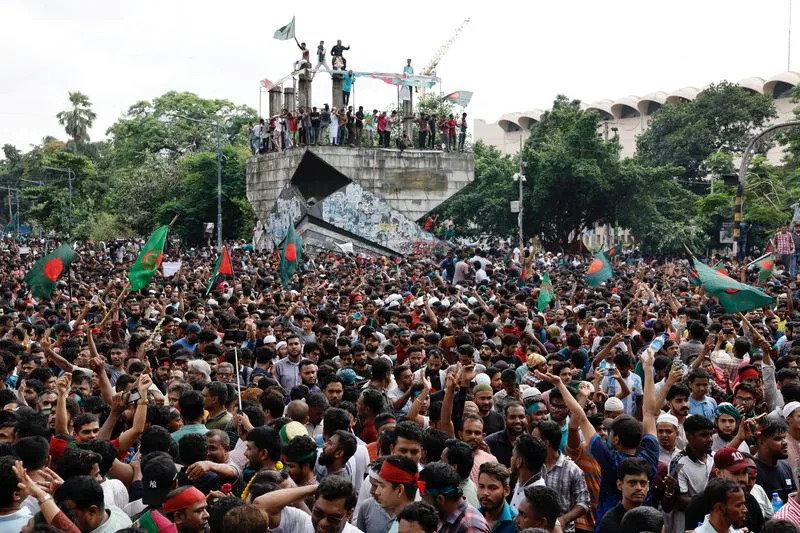
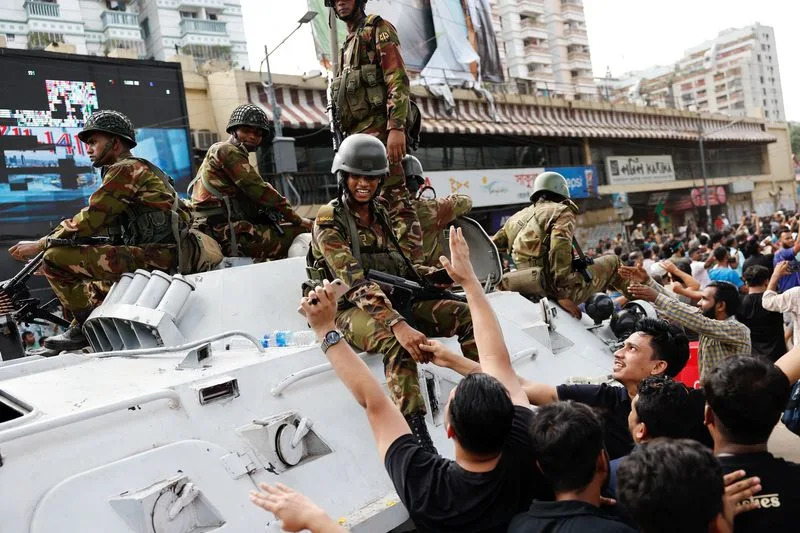
People celebrate the resignation of Bangladeshi Prime Minister Hasina in Dhaka
By Ruma Paul and Sudipto Ganguly
DHAKA (Reuters) -Bangladesh Prime Minister Sheikh Hasina resigned on Monday and fled the country, as more people were killed in some of the worst violence since the birth of the South Asian nation more than five decades ago.
Army chief General Waker-Uz-Zaman announced Hasina's resignation in a televised address to the nation and said an interim government would be formed.
Media reports said Hasina, 76, was flown in a military helicopter with her sister and was headed to India. The CNN News 18 television channel said she had landed in Agartala, the capital of India's northeastern state of Tripura, across the eastern border of Bangladesh.
Reuters could not immediately verify the reports.
Bangladesh has been engulfed by protests and violence after student protests last month against reservation quotas in government jobs escalated into a campaign for the ouster of Hasina, who won a fourth straight term in January in an election boycotted by the opposition.
About 250 people have been killed and thousands injured in the violence.
Army chief Zaman said he had held "fruitful" talks with leaders of all major political parties he had "invited" and would soon meet President Mohammed Shahabuddin to discuss the way ahead.
"The country is going through a revolutionary period," said Zaman, 58, who took over as army chief only on June 23.
"I promise you all, we will bring justice to all the murders and injustice. We request you to have faith in the army of the country. I take full responsibility and I assure you to not get disheartened," he said.
"I request you all to be a little patient, give us some time and together we will be able to solve all the problems," Zaman said. "Please don't go back to the path of violence and please return to non-violent and peaceful ways."
Television visuals showed thousands of people pouring into the streets of the capital Dhaka in jubilation and shouting slogans. Thousands also stormed Hasina's official residence 'Ganabhaban', shouting slogans, pumping fists and showing victory signs.
Crowds thronged the drawing rooms of the residence, and some people could be seen carrying away televisions, chairs and tables from what was one of the most protected buildings in the country.
"She has fled the country, fled the country," some shouted.
Protesters in Dhaka also climbed atop a large statue of independence leader Sheikh Mujibur Rahman, Hasina's father, and began chiselling away at the head with an axe, the visuals showed.
WEEKS OF PROTESTS, VIOLENCE
Student activists had called for a march to the capital Dhaka on Monday in defiance of a nationwide curfew to press Hasina to resign, after deadly clashes across the country on Sunday killed nearly 100 people.
On Monday, at least six people were killed in clashes between police and protesters in the Jatrabari and Dhaka Medical College areas on Monday, the Daily Star newspaper reported. Reuters could not immediately verify the report.
Sunday's death toll, which included at least 13 policemen, was the highest for a single day from any protests in Bangladesh's recent history, surpassing the 67 deaths reported on July 19 when students took to the streets against the quotas.
Last month, at least 150 people were killed and thousands injured in violence touched off by student groups protesting against quotas for government jobs.
The government declared the indefinite nationwide curfew starting at 6 p.m. (1200 GMT) on Sunday and also announced a three-day general holiday starting from Monday.
Over the weekend, there have been attacks, vandalism and arson targeting government buildings, offices of the ruling Awami League party, police stations and houses of public representatives, local media reported. Violence was reported in 39 of the country's 64 districts.
Bangladesh Railway said it had suspended all services indefinitely due to the escalating violence.
Garment factories in the country, which supply apparel to some of the top brands in the world, have also been closed indefinitely.
The role of the country's army in tackling the violence had come into focus with a group of retired military officers urging Hasina to withdraw troops from the streets and undertake "political initiatives" to resolve the crisis.
Critics of Hasina, along with human rights groups, have accused her government of using excessive force against protesters, a charge she and her ministers deny.
Hasina had said that "those who are carrying out violence are not students but terrorists who are out to destabilise the nation".
(Reporting by Ruma Paul and Sudipto Ganguly; Additional reporting by Shilpa Jamkhandikar, Shivam Patel, Tanvi Mehta and Indranil Sarkar; Writing by YP Rajesh; Editing by Raju Gopalakrishnan)
Our Foreign Staff
Mon, August 5, 2024
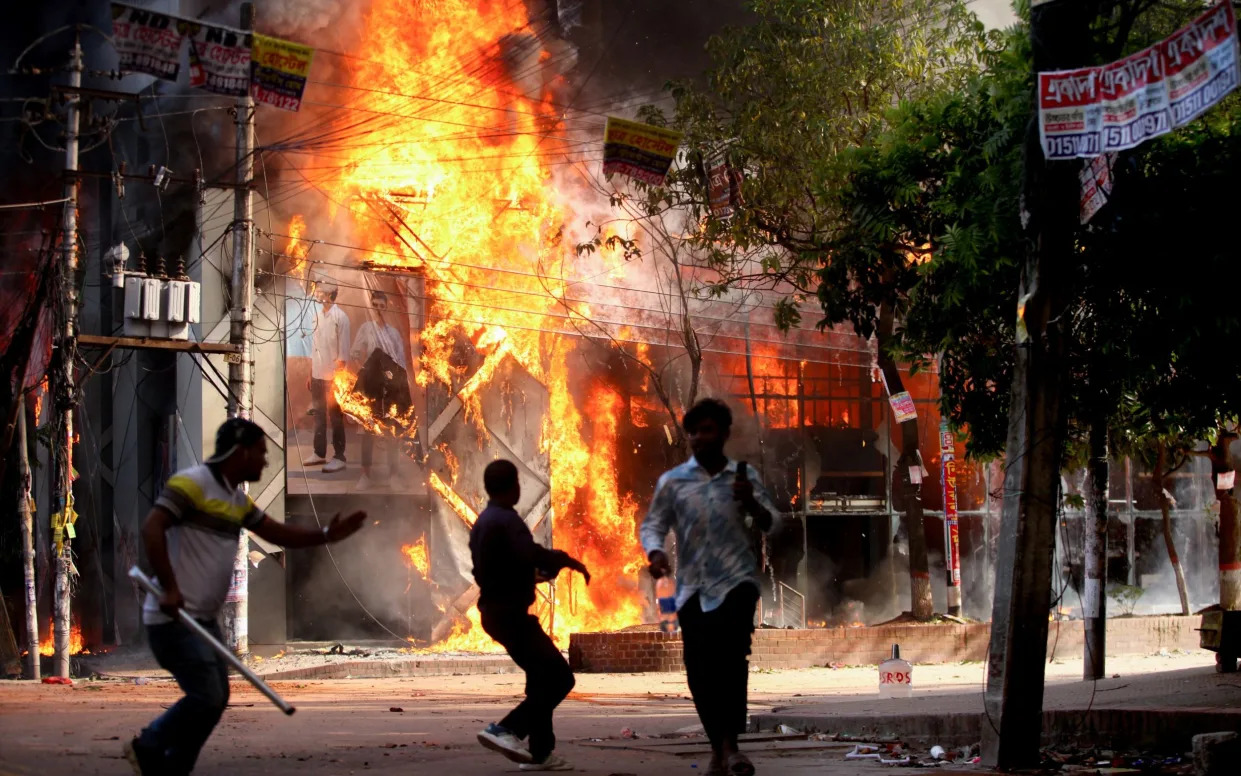
Bangladesh's PM has fled the country after riots - AFP/AFP
The prime minister of Bangladesh has resigned and fled the country for a “safer place” amid violent protests demanding her resignation.
Thousands of Bangladeshi protesters stormed Sheikh Hasina’s palace in Dhaka’s capital on Monday.
Bangladesh’s army chief Waker-Uz-Zaman said Monday he would “form an interim government”.
Local network Channel 24 broadcasted images of crowds running into the premier’s official residence in the capital, waving to the camera as they celebrated.

Bangladesh has been engulfed by protests and violence that began last month after student groups demanded scrapping of a controversial quota system in government jobs.
That escalated into a campaign to seek the ousting of Ms Hasina, who won a fourth straight term in January in an election boycotted by the opposition.
At least 91 people were killed and hundreds injured on Sunday in a wave of violence across the country of 170 million people as police fired tear gas and rubber bullets to disperse tens of thousands of protesters. The total death toll from the unrest has reached 280.

Sheikh Hasina has fled Bangladesh - AFP
Ms Hasina and her younger sister left the country in a military helicopter on Monday, Bangladesh’s top newspaper Dhaka Tribune reported.
“She and her sister have left Ganabhaban (the premier’s official residence) for a safer place,” a source told AFP. “She wanted to record a speech. But she could not get an opportunity to do that.”
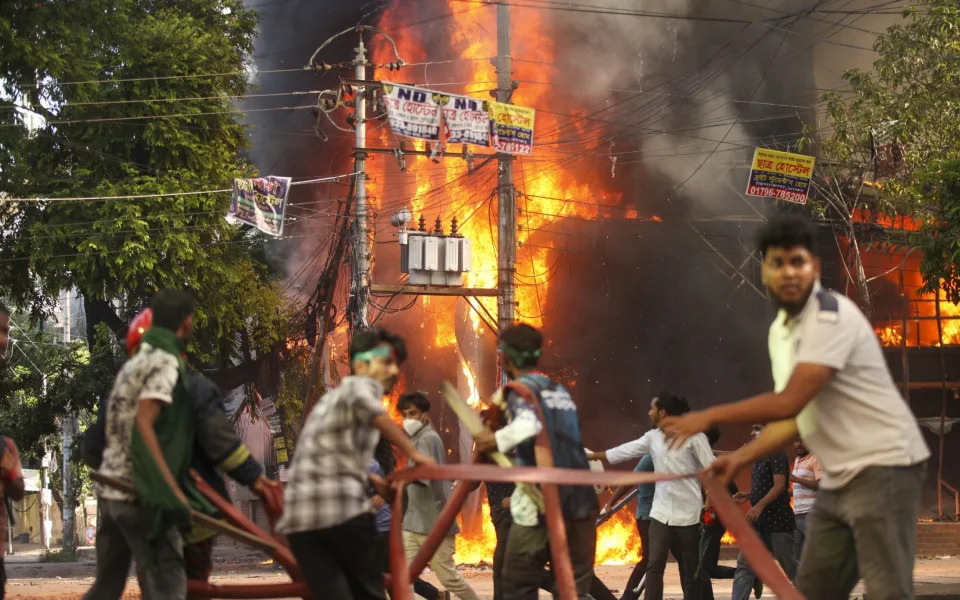
A garment store set ablaze in Dhaka - Abu Sufian Jewel/ZUMA Press Wire/Shutterstock/Shutterstock
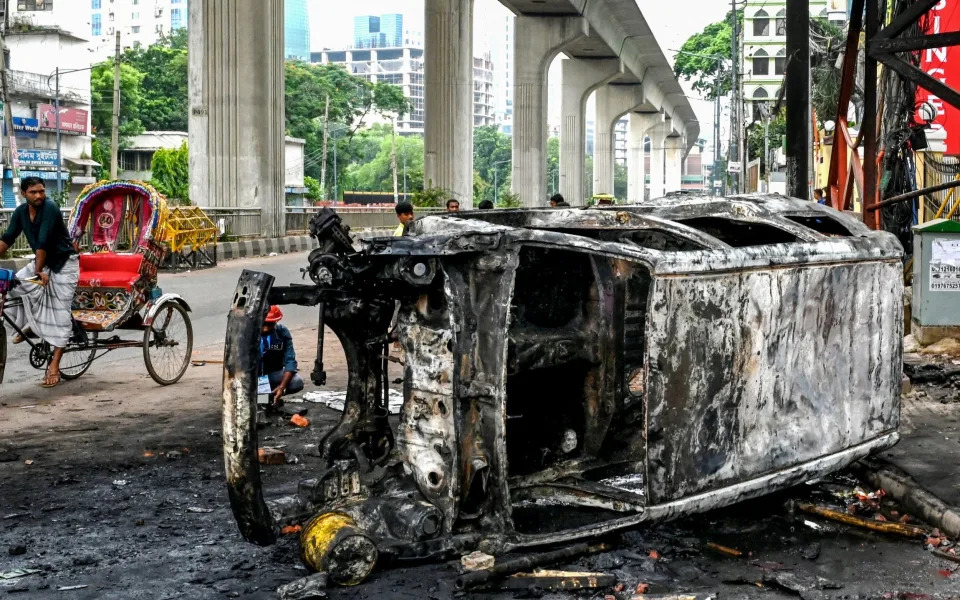
Bangladeshis pass a burnt-out vehicle after anti-government protests - Munir Uz Zaman/AFP
Protesters on Monday defied security forces enforcing a curfew, marching on the capital’s streets after the deadliest day of unrest since demonstrations erupted last month.
Internet access was tightly restricted on Monday, offices were closed and more than 3,500 factories servicing Bangladesh’s economically vital garment industry were shut.
Soldiers and police with armoured vehicles in Dhaka had barricaded routes to Hasina’s office with barbed wire but vast crowds flooded the streets, tearing down barriers.
The Business Standard newspaper estimated as many as 400,000 protesters were on the streets.
“The time has come for the final protest,” said Asif Mahmud, one of the key leaders in the nationwide civil disobedience campaign
Charlie Campbell
Mon, August 5, 2024

Bangladesh's Prime Minister Sheikh Hasina Wajed at the 25th International Conference on the Future of Asia, in Tokyo on May 30, 2019.
Bangladesh’s embattled Prime Minister Sheikh Hasina resigned Monday under pressure from the military following escalating clashes between police and anti-government protesters that resulted in at least 300 deaths, including more than 90 on Sunday alone.
Reports that Hasina had stepped down circulated before Bangladesh army chief Waker-uz-Zaman confirmed the news in an address to the nation at 4 p.m. local time, prompting widespread jubilation among crowds that poured onto the street, honking car horns and waving flags.
“Prime Minister Sheik Hasina has resigned and an interim government will run the country,” army chief General Waker-uz-Zaman told the nation. He added there was no more need for a curfew or state of emergency at present but urged protesters to return home.
Barricades were removed and internet access suddenly restored as rumors circulated that Hasina had fled overseas. Even before Waker-uz-Zaman’s announcement, which was repeatedly delayed amid negotiations with political players, protesters had already stormed the Ganabhaban, the prime minister’s official residence in the capital Dhaka.
What began last month as peaceful student demonstrations against civil service employment quotas for descendants of the nation’s 1971 war of independence spiraled into a campaign of protest and civil disobedience across the South Asian nation of over 170 million. Hundreds of thousands of protesters had taken to the street over the weekend with crowds swelling to millions by Monday amid calls to march on the Ganabhaban to force Hasina’s ouster. The prospect of a bloody confrontation spurred the military into action.
Until the end, Hasina, 76, had been defiant, leading commentators to assume that her departure was effectively a coup d’etat. In comments following a meeting with security chiefs, she insisted demonstrators were “not students but terrorists who are out to destabilize the nation.” Still, the scale and breadth of public anger made the position of her Awami League party—which was returned for a fourth straight term in January elections boycotted by the opposition and denounced by observers as neither free nor fair—increasingly untenable.
“Public reactions after the brutal crackdown showed that the people were waiting for a leadership to challenge the regime,” says Ali Riaz, a Bangladeshi-American political scientist and professor at Illinois State University. “Keeping with the long tradition of student activism in Bangladesh, these leaders stepped up.”
Hasina’s downfall was especially dramatic as it metastasized quickly out of nowhere. Her chief mistake appears to have been dispatching the Chhatra League, the Awami League’s aggressive student wing, to confront initially peaceful demonstrators. Those clashes spurred a brutal crackdown by security forces, which diplomatic sources tell TIME could in truth involve over 1,000 killed. A subsequent nationwide curfew and internet blackout alienated both private citizens and business leaders across South Asia’s second biggest economy.
After an uneasy calm was restored, security forces set about rounding up student leaders and thousands of opposition activists. This purge alongside a deluge of cellphone footage of unarmed students killed in the street spurred protesters to increase their demand that Hasina step down. In particular, UNICEF reports that at least 32 children had been killed during the demonstrations, many shot inside their homes, further outraged the public. Hasina appeared aloof and callous throughout, ostentatiously crying over damage to a train station while lambasting deceased students as “traitors” and “terrorists.”
Hasina’s position always relied on Bangladesh’s military, which has historically meddled in politics though had recently been staunch backers of the Awami League. Yet on Sunday, Waker-uz-Zaman tellingly said the armed forces “always stood by the people,” while his influential predecessor, General Ikbal Karim Bhuiyan, denounced “egregious killings” of a “disgraceful campaign” and called on troops to return to the barracks.
The U.N. had already raised objections to vehicles emblazoned with its insignia being used to target protesters, prompting calls to ban the Bangladesh military from the bloc’s peacekeeping missions, further alienating its top brass. On Sunday, the U.N.’s human rights chief, Volker Türk, urged the government to “cease targeting those participating peacefully in the protest movement, immediately release those arbitrarily detained, restore full internet access, and create conditions for meaningful dialogue.”
Riaz says the generals were likely assessing the “resilience capacity of the movement in the face of repression, and also trying to see whether Sheikh Hasina needs an exit window” before acting. “It would rather wait until it becomes the only option to the political forces and the public at large.”
Still, the fall of Hasina is only the first step in what will no doubt be a bitter reconciliation process. With practically every government institution politicized by the Awami League, distrust of the security services, military, courts, and civil service runs deep across society.
“There is a huge trust deficit between the ruling party, activists, police and the people,” says Mubashar Hasan, a Bangladeshi scholar at the University of Oslo in Norway. “If there is no effective reconciliation process, the country may go into uncharted territory.”
Write to Charlie Campbell at charlie.campbell@time.com.
Bangladesh PM Sheik Hasina resigns and flees country after protests
Anbarasan Ethirajan - BBC News
Mon, August 5, 2024
Bangladeshi Prime Minister Sheikh Hasina has resigned after weeks of deadly anti-government protests as thousands of people stormed her official residence, demanding she step down.
Ms Hasina, 76, had already left the country to a "safer place", one of her advisers said, before crowds arrived at her palace.
The resignation came a day after at least 90 people were killed and hundreds injured in a new round of demonstrations.
The unrest in Dhaka and elsewhere began with a demand to abolish quotas in civil service jobs but escalated into a mass anti-government movement.

Protesters blocked a motorway in Bangladesh's capital city [Getty Images]
Entrances to Dhaka were blocked on Monday, with army units and police deployed across the city.
The internet was also completely shut down before being restored a few hours later.
The government had also announced a three-day "holiday" - widely interpreted as a curfew - which closed down businesses and the courts.
However, this did not stop tens of thousands of people from converging on the city, heeding a call by protest leaders to start a "long march to Dhaka". Anger was high following the deaths - mostly of protesters - on Sunday.
Both police and some supporters of the governing party were seen shooting at anti-government protesters with live ammunition. Police also used tear gas and rubber bullets.
Thirteen police officers were also killed on Sunday when thousands of people attacked a police station in the district of Sirajganj, police said. Two more police died of their injuries on Monday following the attack. Elsewhere there were reports of several more protesters being killed.
The total death toll from weeks of unrest now stands at some 300, most of them protesters shot by security forces.
Mobile operators received orders from the government to shut off their 4G services on Monday, reports said.
The country is "again in the midst of a near-total national internet shutdown after earlier social media and mobile cuts", said NetBlocks, a watchdog that monitors internet freedom.
On 18 July, the Bangladeshi government had also switched off the country's mobile internet in an attempt to quell the protests. Broadband connectivity was restored a week later, while mobile internet services came back online days after.
But neither the internet blackout nor an indefinite nationwide curfew imposed on Sunday have hindered the protesters across Bangladesh.
On Monday, thousands of protesters started marching in Uttara, a suburb of Dhaka, chanting and demanding Ms Hasina's resignation - under the watchful eye of army personnel and police officers who have been stationed across various points in the capital.
Amid calls for her resignation, Ms Hasina initially sounded defiant. Speaking after a meeting with security chiefs on Monday, she said the protesters were "not students but terrorists who are out to destabilise the nation".
On Sunday, Law and Justice Minister Anisul Huq told the BBC’s Newshour programme that authorities were showing “restraint”.
“If we had not shown restraint, there would have been a bloodbath. I guess our patience has limits,” he added.
Bangladesh blocks internet as more violence and protests expected
Why is the Bangladeshi government facing so much anger?
Deaths and injuries have also been reported across the country, including the northern districts of Bogra, Pabna and Rangpur.
On Sunday, thousands of people gathered in a main square in Dhaka and there were violent incidents in other parts of the city.
“The whole city has turned into a battleground,” a policeman, who asked not to be named, told the AFP news agency. He said a crowd of several thousand protesters had set fire to cars and motorcycles outside a hospital.
Asif Mahmud, a leading figure in the nationwide civil disobedience campaign, called on protesters to march on Dhaka on Monday.
"The time has come for the final protest," he said.
Students Against Discrimination, a group behind the anti-government demonstrations, urged people not to pay taxes or any utility bills.
The students have also called for a shutdown of all factories and public transport.
Around 10,000 people have been reportedly detained in a major crackdown by security forces in the past two weeks. Those arrested included opposition supporters and students.
Some ex-military personnel have expressed support for the student movement, including ex-army chief General Karim Bhuiyan, who told journalists: “We call on the incumbent government to withdraw the armed forces from the street immediately.
He and other ex-military personnel condemned "egregious killings, torture, disappearances and mass arrests".
Some of the wounded were driven away by protesters [Getty Images]
The protests began when students took to the streets last month over a quota that reserved one third of civil service jobs for relatives of the veterans of Bangladesh’s independence war with Pakistan in 1971.
Most of the quota has now been scaled back by the government following a Supreme Court ruling, but students have continued to protest, demanding justice for those killed and injured, and for Ms Hasina to step down.
Earlier, Ms Hasina offered unconditional dialogue with the student leaders.
“I want to sit with the agitating students of the movement and listen to them. I want no conflict," she said.
But the student protesters have rejected that offer.
Bangladeshi media say most of those killed in last month’s protests were shot dead by police. Thousands were injured.
The government has argued that police opened fire only in self-defence and to protect state properties.
Additional reporting by Kelly Ng in Singapore
KRUTIKA PATHI AND JULHAS ALAM
Mon, August 5, 2024

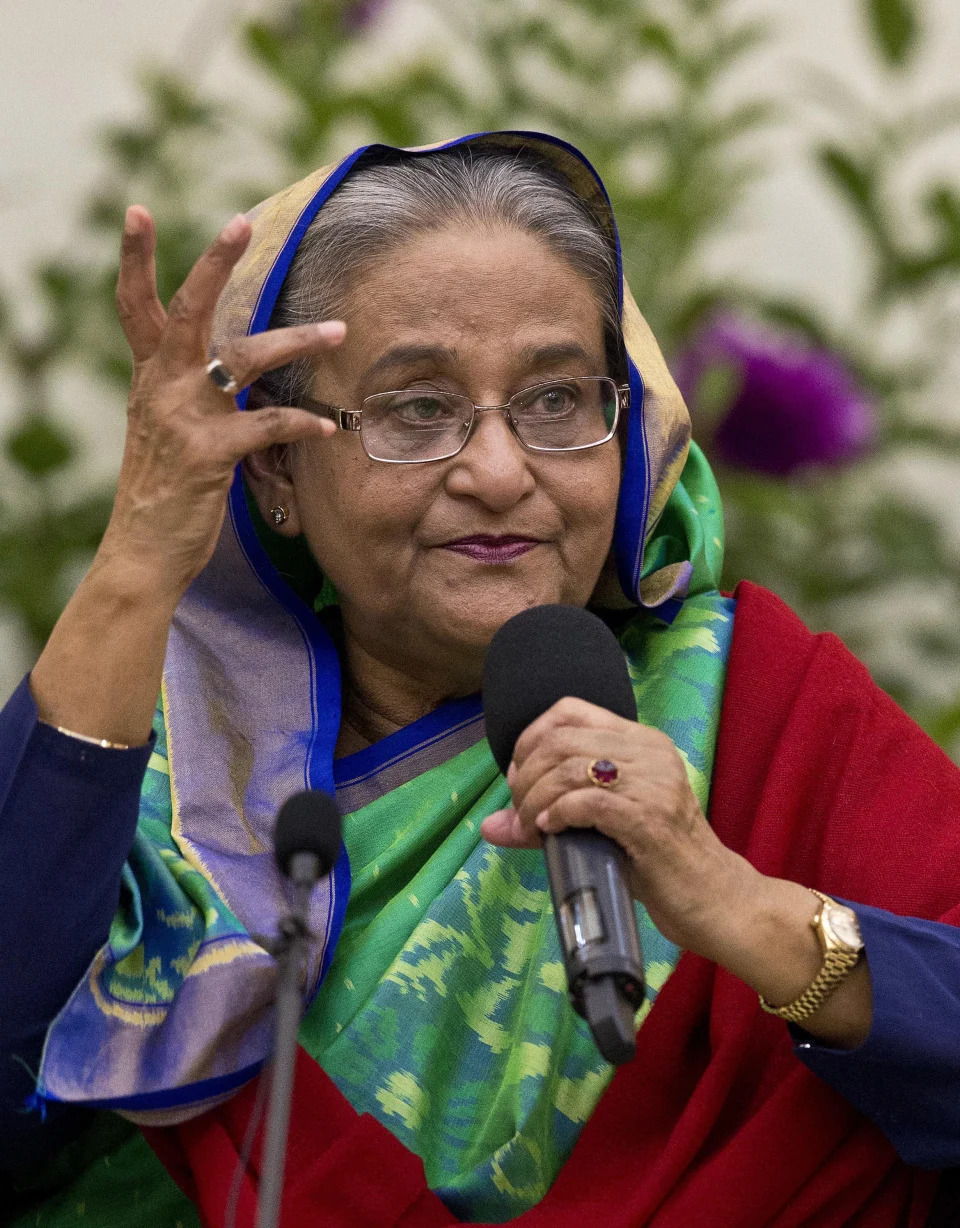
Bangladesh's Prime Minister Sheikh Hasina gestures as she speaks during a press conference in Dhaka, Bangladesh, Monday, Jan. 6, 2014. Hasina resigned on Monday, June 5, 2024, ending 15 years in power as thousands of protesters defied a military curfew and stormed her official residence.
DHAKA, Bangaladesh (AP) — Sheikh Hasina, the longest-serving prime minister in Bangladesh’s history, resigned and fled the country on Monday, bringing a tumultuous end to her 15-year-long rule as an extraordinary wave of protest succeeded in toppling her government.
Her ouster came after weeks of relentless protests and clashes with security forces that have killed nearly 300 people since mid-July, according to local media reports. What began as peaceful demonstrations by students frustrated with a quota system for government jobs unexpectedly grew into a major uprising against Hasina and her ruling Awami League party.
The recent upheaval was the largest and last crisis for the 76-year-old leader, the world's longest-serving female head of government, who won a fourth consecutive term in January in an election boycotted by the main opposition amid concerns that the polls were not free or fair.
How it all began
Hasina first became prime minister in 1996, and then returned in 2008 to win the office she held until Monday.
Analysts who have tracked her rise say her political life was driven by tragedy. On Aug. 15, 1975, her father and the first leader of independent Bangladesh, Sheikh Mujib Rahman was assassinated in a military coup.
That fateful night, while 28-year-old Hasina was in Germany with her younger sister, a group of army officers burst into the family’s Dhaka home and killed her parents, three other siblings and the household staff — 18 people in all.
Some say the brutal act pushed her to consolidate unprecedented power. It was also what motivated her throughout her political career, analysts say.
“Hasina has one very powerful quality as a politician — and that is to weaponize trauma,” said Avinash Paliwal, a former university lecturer who specialized in South Asian strategic affairs said in January ahead of the general election.
To Hasina, her father was the founder of independent Bangladesh after its forces, aided by India, defeated Pakistan in 1971.
After the assassination, Hasina lived for years in exile in India, then made her way back to Bangladesh and took over the Awami League. But the country's military rulers had her in and out of house detention all through the 1980s until, after general elections in 1996, she became prime minister for the first time.
Two women, two parties
What followed was a decadeslong power struggle between Hasina and former Prime Minister Khaleda Zia, the chief of the main opposition Bangladesh Nationalist Party, who's now ailing and under house arrest.
The two women ran the country alternatively for years in a bitter rivalry that polarized Bangladesh politics. Hasina has often accused the BNP of courting hard-line extremists that her party, which calls itself moderate and secular, had worked to stamp out, while Zia’s BNP claims the Awami League is using oppressive tactics to stay in power.
The two traded blame as the recent protests turned violent. The BNP, which backed the student protesters, repeated calls for Hasina to step down while she accused them of stoking the violence.
She said the protests had been overtaken by the BNP and another opposition party that her government banned recently.
Years of turmoil
After Hasina lost the general election in 2001, she became the leader of the opposition. Political violence, unrest and military interventions marked the years until she was reelected.
Back in power, she fixed her sights on the economy and built infrastructure previously unseen in Bangladesh. A strong electricity grid that reaches far-flung villages; big-ticket projects such as highways, rail lines and ports. The country’s garment industry became one of the world’s most competitive.
The development gains sparked other advances: girls were educated on par with boys, and an increasing swell of women joined the workforce. Those close to her described Hasina as hands-on and passionate about uplifting women and poor people.
On the international stage, Hasina cultivated ties with powerful countries including both India and China. But the United States and other Western nations expressed concerns over human rights violations and press freedoms, straining relations. In January, after she won a fourth consecutive term, the U.S. and the United Kingdom said the polls were not credible, free and fair. Previous elections in 2018 and 2014 were also marred by allegations of vote rigging and a boycott from opposition parties.
Her critics for years accused her government of using harsh tools to muzzle dissent, shrink press freedoms and curtail civil society. Rights groups have also cited forced disappearances of critics, which her government denied.
Opposition rises
Her government employed the same heavy-handed approach when these protests began, which inflamed tensions even more, analysts said.
The student-led movement also came as Bangladesh underwent an economic churn given the recent global slowdown. Ahead of the January polls, there was labor unrest and dissatisfaction with the government.
But the latest furore highlighted the extent of economic distress in the country, where exports have fallen and foreign exchange reserves are running low. Experts say there’s a lack of quality jobs for young graduates, who increasingly seek the more stable and lucrative government jobs.
“There have been plenty of protests during Awami League’s regime over the last 15 years, but nothing as large, long, and violent as this one,” said Michael Kugelman, director of the South Asia Institute at the Wilson Center. He added that the especially ferocious government response of excessive force and deep pent up anger at the state as well as growing economic stress led to the escalation.
What's next?
After 15 years of Hasina's administration, it’s not clear what comes next.
Shortly after she was seen on TV boarding a military helicopter with her sister, the country’s military chief, Gen. Waker-uz-Zaman, said he would seek the president’s guidance on forming an interim government.
He promised that the military would launch an investigation into the deadly crackdown on student-led protests that fueled outrage against the government.
“Keep faith in the military, we will investigate all the killings and punish the responsible,” he said. “I have ordered that no army and police will indulge in any kind of firing.”
“Now, the students’ duty is to stay calm and help us,” he added.
Thousands of protesters celebrated in the capital, waving Bangladeshi flags as the news broke, while others looted her official residence, carrying out furniture and even fish from the kitchens.
It is an “end of a regime that delivered a lot of development but was increasingly authoritarian, as we saw with the mass killings these past weeks,” said Naomi Hossain, a research professor specializing in Bangladesh at the London-based SOAS University.
The country has seen interim governments in the past, Hossain said, adding that for now the hope is that the army will ensure peace.
But there are fears of reprisal violence. “It could get ugly if the army isn’t able to calm people down and defuse the issue. It could be a while before we are out of the woods,” she added.
___
Pathi reported from New Delhi.
Bangladesh prime minister resigns after weeks of violent protests
DPA
Mon, August 5, 2024
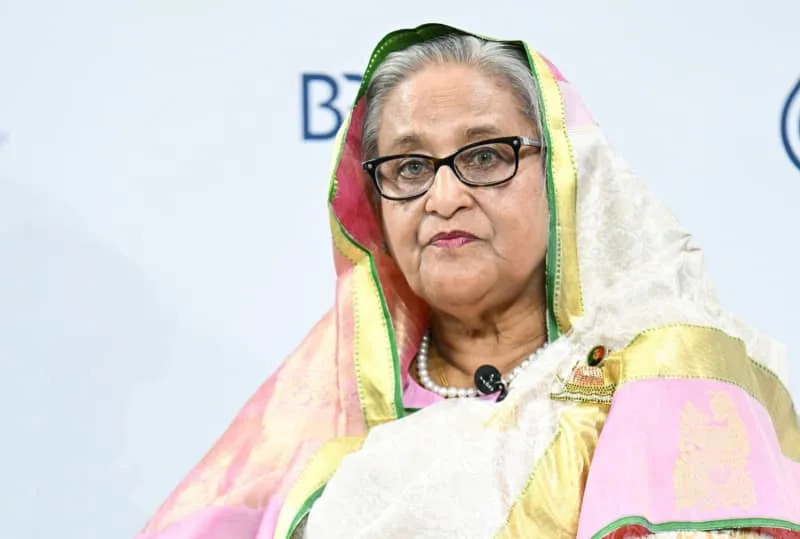
Bangladesh Prime Minister Sheikh Hasina, attends a discussion at the opening of the 60th Munich Security Conference (MSC) at the Hotel Bayerischer Hof. Tobias Hase/dpa
Following weeks of violent student protests that left roughly more than 300 people dead, Bangladesh Prime Minister Sheikh Hasina has resigned, army chief General Waker-Uz-Zaman said on Monday.
“An interim government will be formed,” the army chief told a news briefing after a meeting with leaders of different political parties, excluding those from Hasina’s Awami League party.
“Justice will be done for all those killings and atrocities, please keep confidence on the army,” he urged, calling on protesting students to remain patient and refrain from further violence.
Protesters, seen dancing and chanting slogans against Hasina, gathered at Dhaka University campus, the initial site of the protests against the controversial public job quota system.
Following news of Hasina’s resignation, numerous Awami League offices and leaders' homes across Dhaka and other areas were attacked and looted.
Thousands of protesters stormed the prime minister's official residence in Dhaka after she reportedly fled the country.
An official, preferring not to be named, at the foreign ministry confirmed that Hasina left for India in the afternoon.
Earlier on Monday, thousands of people again took to the streets and vowed to “march to Dhaka” to demand the resignation of the prime minister.
The violence flared up again after Saturday's call to civil disobedience by student leaders, who rejected a government offer to end violence through dialogue.
The authorities had given in to the students' demands to reform an unpopular job quota system, after protests in mid-July left more than 200 people dead.
Bangladesh PM Sheikh Hasina resigns, interim government to be formed
Updated Mon, August 5, 2024


By Ruma Paul and Sudipto Ganguly
DHAKA (Reuters) -Bangladesh Prime Minister Sheikh Hasina resigned on Monday and fled the country, as more people were killed in some of the worst violence since the birth of the South Asian nation more than five decades ago.
Army chief General Waker-Uz-Zaman announced Hasina's resignation in a televised address to the nation and said an interim government would be formed.
Media reports said Hasina, 76, was flown in a military helicopter with her sister and was headed to India. The CNN News 18 television channel said she had landed in Agartala, the capital of India's northeastern state of Tripura, across the eastern border of Bangladesh.
Reuters could not immediately verify the reports.
Bangladesh has been engulfed by protests and violence after student protests last month against reservation quotas in government jobs escalated into a campaign for the ouster of Hasina, who won a fourth straight term in January in an election boycotted by the opposition.
About 250 people have been killed and thousands injured in the violence.
Army chief Zaman said he had held "fruitful" talks with leaders of all major political parties he had "invited" and would soon meet President Mohammed Shahabuddin to discuss the way ahead.
"The country is going through a revolutionary period," said Zaman, 58, who took over as army chief only on June 23.
"I promise you all, we will bring justice to all the murders and injustice. We request you to have faith in the army of the country. I take full responsibility and I assure you to not get disheartened," he said.
"I request you all to be a little patient, give us some time and together we will be able to solve all the problems," Zaman said. "Please don't go back to the path of violence and please return to non-violent and peaceful ways."
Television visuals showed thousands of people pouring into the streets of the capital Dhaka in jubilation and shouting slogans. Thousands also stormed Hasina's official residence 'Ganabhaban', shouting slogans, pumping fists and showing victory signs.
Crowds thronged the drawing rooms of the residence, and some people could be seen carrying away televisions, chairs and tables from what was one of the most protected buildings in the country.
"She has fled the country, fled the country," some shouted.
Protesters in Dhaka also climbed atop a large statue of independence leader Sheikh Mujibur Rahman, Hasina's father, and began chiselling away at the head with an axe, the visuals showed.
WEEKS OF PROTESTS, VIOLENCE
Student activists had called for a march to the capital Dhaka on Monday in defiance of a nationwide curfew to press Hasina to resign, after deadly clashes across the country on Sunday killed nearly 100 people.
On Monday, at least six people were killed in clashes between police and protesters in the Jatrabari and Dhaka Medical College areas on Monday, the Daily Star newspaper reported. Reuters could not immediately verify the report.
Sunday's death toll, which included at least 13 policemen, was the highest for a single day from any protests in Bangladesh's recent history, surpassing the 67 deaths reported on July 19 when students took to the streets against the quotas.
Last month, at least 150 people were killed and thousands injured in violence touched off by student groups protesting against quotas for government jobs.
The government declared the indefinite nationwide curfew starting at 6 p.m. (1200 GMT) on Sunday and also announced a three-day general holiday starting from Monday.
Over the weekend, there have been attacks, vandalism and arson targeting government buildings, offices of the ruling Awami League party, police stations and houses of public representatives, local media reported. Violence was reported in 39 of the country's 64 districts.
Bangladesh Railway said it had suspended all services indefinitely due to the escalating violence.
Garment factories in the country, which supply apparel to some of the top brands in the world, have also been closed indefinitely.
The role of the country's army in tackling the violence had come into focus with a group of retired military officers urging Hasina to withdraw troops from the streets and undertake "political initiatives" to resolve the crisis.
Critics of Hasina, along with human rights groups, have accused her government of using excessive force against protesters, a charge she and her ministers deny.
Hasina had said that "those who are carrying out violence are not students but terrorists who are out to destabilise the nation".
(Reporting by Ruma Paul and Sudipto Ganguly; Additional reporting by Shilpa Jamkhandikar, Shivam Patel, Tanvi Mehta and Indranil Sarkar; Writing by YP Rajesh; Editing by Raju Gopalakrishnan)
Bangladesh's PM resigns and flees country as protesters storm her residence capping weeks of unrest
JULHAS ALAM and KRUTIKA PATHI
Updated Mon, August 5, 2024
DHAKA, Bangladesh (AP) — Bangladesh’s prime minister resigned and fled the country Monday, after weeks of protests against a quota system for government jobs descended into violence and grew into a broader challenge to her 15-year rule. Thousands of demonstrators stormed her official residence, a day after nearly 100 died in the unrest.
Prime Minister Sheikh Hasina's departure threatens to create even more instability in the nation on India's border already dealing with a series of crises, from high unemployment and corruption to climate change.
Hours after the embattled leader was seen on TV boarding a military helicopter with her sister, the country's military chief, Gen. Waker-uz-Zaman, said he would seek the president's guidance on forming an interim government.
He promised that the military would launch an investigation into the deadly crackdown on student-led protests that fueled outrage against the government.
“Keep faith in the military, we will investigate all the killings and punish the responsible,” he said. “I have ordered that no army and police will indulge in any kind of firing.”
He met opposition politicians, including the head of the now-banned Jamaat-e-Islami party, and civil society members before making his statement.
The protests began peacefully as frustrated students demanded an end to a quota system for government jobs that they said favored those with connections to the prime minister's Awami League party, but the demonstrations have since morphed into an unprecedented challenge to Hasina and the party.
The 76-year-old — who was the longest-serving female head of government — was elected for a fourth consecutive term in a January vote that was boycotted by her main opponents. Thousands of opposition members were jailed in the lead-up to the polls, and the U.S. and the U.K. denounced the result as not credible, though the government defended it.
Hasina had cultivated ties with powerful countries, including both India and China. But under her, relations with United States and other Western nations have come under strain, as they have expressed concerns over human rights violations and press freedoms in the predominantly Muslim nation of 170 million people.
Her political opponents have previously accused her of growing increasingly autocratic and called her a threat to the country’s democracy, and many now say the unrest is a result of that authoritarian streak.
Hasina arrived Monday in a city in India on the border with Bangladesh in an army helicopter, according to a military official who spoke on condition of anonymity because he was not authorized to release the information to the media. It was not clear where she would go next.
As she fled, people stormed her residence, taking furniture and pulling food from the refrigerators.
Protests have continued even after the Supreme Court last month ruled that the quota system — which set aside up to 30% of government jobs for family members of veterans who fought in Bangladesh’s war of independence against Pakistan — must be drastically cut. The government attempted to quell the demonstrations with force, leaving nearly 300 people dead since mid-July.
At least 95 people, including at least 14 police officers, died in clashes in the capital on Sunday, according to the country's leading Bengali-language daily newspaper, Prothom Alo. Hundreds more were injured.
At least 11,000 people have been arrested in recent weeks. The unrest has also resulted in the closure of schools and universities across the country, and authorities at one point imposed a shoot-on-sight curfew.
Authorities also shut off mobile internet on Sunday in an attempt to quell the unrest, and broadband internet was cut briefly Monday morning. It was the second internet blackout in the country since July, but services were restored later Monday.
Over the weekend, protesters called for a “non-cooperation” effort, urging people not to pay taxes or utility bills and not to show up for work on Sunday, a working day in Bangladesh. Offices, banks and factories opened, but commuters in Dhaka and other cities struggled to get to their jobs since much public transport was halted amid fears of violence.
Hasina offered to talk with student leaders on Saturday, but a coordinator refused and demanded her resignation.
Hasina repeated her pledges to investigate the deaths and punish those responsible for the violence. She said she was ready to sit down whenever the protesters want. Earlier, she had said protesters who engaged in “sabotage” and destruction were no longer students but criminals, and that the people should deal with them with an iron hand.
Bangladesh Prime Minister Sheikh Hasina Quits and Flees Country Amid Mass Protests, Leading Filmmaker Hopes for Era of Artistic Freedom
Mon, August 5, 2024

Bangladesh’s Prime Minister Sheikh Hasina has resigned and left the country, the BBC reports. This development follows weeks of intense protests and violent clashes across the nation.
According to BBC Bengali, Hasina, who had led Bangladesh since 2009, is reportedly on a helicopter en route to Agartala, India.
More from Variety
Bangladesh Internet in 'Total Shutdown' Amid Student Protests and Dozens of Deaths: 'Things Are Really Turning Bad'
'John Wick,' 'Hunger Games' on the Menu as Lionsgate Play Partners With Grameenphone to Expand Bangladesh Presence (EXCLUSIVE)
Bangladesh's Booming Presence at Busan Points to Against-the-Odds Industry Emergence: 'Superheroes Don't Need to Come From North America'
Military and Ministry of Foreign Affairs officials, speaking anonymously, confirmed the resignation to AP earlier.
Army chief General Waker-Uz-Zaman is expected to address the nation, though his speech has been delayed as he meets with “stakeholders,” per BBC sources.
The situation in Dhaka remains volatile, with thousands of protesters in the streets and more expected to join. Reports indicate demonstrators have entered Hasina’s official residence.
The unrest began as student protests against a quota system reserving up to 30% of government jobs for relatives of 1971 independence war veterans. Protesters argued the system is discriminatory and instead seek a merit-based alternative. It since evolved into a broader anti-government movement with demonstrators calling for an end to Hasina’s 15-year rule.
Recent clashes between protesters and security forces intensified the crisis. The BBC reports at least 90 people were killed in confrontations on Sunday, with the death toll over the past month reaching approximately 300.
Government attempts to quell the demonstrations through force, curfews and internet restrictions have largely backfired, fueling further public outrage.
The military has imposed a curfew as the situation continues to unfold.
Hasina’s departure comes just months after her fourth consecutive election victory in January. That vote was boycotted by her main opponents, raising questions about its legitimacy. In the lead-up to the polls, thousands of opposition members were jailed, though the government maintained the election was democratically held.
In late July, the internet had been shut down and mobile services severely disrupted in Bangladesh amid student protests.
Bangladesh’s most feted filmmaker Mostofa Sarwar Farooki described the events to Variety as “amazing” and Monday as the “second independence for Bangladeshi people.” The country had gained independence from Pakistan in 1971. “The most beautiful part of this movement is that people from all walks of life participated, led by Gen Z youth,” Farooki said. “English medium, Bangla medium, Arabic medium, Hindu, Muslim, Buddhist, Christian, all participated in the movement.”
“It’s an unbelievable feeling,” Farooki added. “People are enjoying. I hope we move towards a beautiful, democratic society where there is freedom of expression, fair justice for all and no corruption. And where there will be artistic freedom and people can make whatever films they want without barriers and not have to worry from the script stage, ‘Can I show this?'”
Farooki’s “Saturday Afternoon” had considerable festival play, winning awards at Fukuoka, Moscow and Vesoul. It takes its cue from the brutal terrorist attack on the Holey Artisan Bakery in Dhaka in 2016, which took place on a quiet Saturday afternoon and left more than 20 people dead. It
The film was initially banned and had finally been cleared for release in January after a four year struggle with the Bangladesh Film Censor Board. However, Bangladesh’s Ministry of Information and Broadcasting took a U turn subsequently.
Sheikh Hasina: Who is Bangladesh's controversial prime minister?
Anbarasan Ethirajan and Tessa Wong - BBC News
Mon, August 5, 2024

Ms Hasina has overseen Bangladesh's economic progress but critics say she has also turned autocratic [Getty Images]
Bangladesh's Prime Minister Sheikh Hasina Wazed has resigned and left the country, after weeks of student-led protests spiralled into deadly, nationwide unrest.
The 76-year-old fled in a helicopter on Monday to India, reports said, as thousands of protesters stormed her official residence in the capital city Dhaka.
This brings an end to the reign of Bangladesh's longest-serving PM, who has wielded a tight grip on the country for more than 20 years in total.
Credited for overseeing the South Asian country's economic progress, Ms Hasina has however in recent years been accused of turning autocratic.
How did Sheikh Hasina come to power?
Born to a Muslim family in East Bengal in 1947, Ms Hasina had politics in her blood.
Her father was the nationalist leader Sheikh Mujibur Rahman, Bangladesh's 'Father of the Nation' who led the country's independence from Pakistan in 1971 and became its first president.
At that time, Ms Hasina herself had already established a reputation as a student leader at Dhaka University.
Mr Rahman was assassinated with most of his family members in a military coup in 1975. Only Ms Hasina and her younger sister survived as they were travelling abroad at the time.
After living in exile in India, Ms Hasina returned to Bangladesh in 1981 and became the leader of the political party her father belonged to, the Awami League.
She joined hands with other political parties to hold pro-democracy street protests during the military rule of General Hussain Muhammed Ershad. Propelled by the popular uprising, Ms Hasina quickly became a national icon.
She was first elected to power in 1996. She earned credit for signing a water-sharing deal with India and a peace deal with tribal insurgents in the south-east of the country.
But at the same time, her government was criticised for numerous allegedly corrupt business deals and for being too subservient to India.
She later lost to her former ally turned nemesis, Begum Khaleda Zia of the Bangladesh Nationalist Party (BNP), in 2001.
As heirs to political dynasties, both women have dominated Bangladesh politics for more than three decades and are known as the "battling Begums". Begum refers to a Muslim woman of high rank.
Observers say their bitter rivalry has resulted in bus bombs, disappearances and extrajudicial killings becoming regular occurrences.
Ms Hasina eventually came back to power in 2009 in polls held under a caretaker government.
A true political survivor, she endured numerous arrests while in opposition as well as several assassination attempts, including one in 2004 that damaged her hearing. She has also survived efforts to force her into exile and numerous court cases in which she has been accused of corruption.

Propelled by the pro-democracy movement in the 1980s and early 1990s, Ms Hasina became a national icon [Getty Images]
What has she achieved?
Bangladesh under Ms Hasina presents a contrasting picture. The Muslim-majority nation, once one of the world's poorest, has achieved credible economic success under her leadership since 2009.
It's now one of the fastest-growing economies in the region, even surpassing its giant neighbour India.
Its per capita income has tripled in the last decade and the World Bank estimates that more than 25 million people have been lifted out of poverty in the last 20 years.
Much of this growth has been fuelled by the garment industry, which accounts for the vast majority of total exports from Bangladesh and has expanded rapidly in recent decades, supplying markets in Europe, North America and Asia.
Using the country's own funds, loans and development assistance, Ms Hasina's government has undertaken huge infrastructure projects, including the flagship $2.9bn Padma bridge across the Ganges.
What is the controversy surrounding her?
The latest protests were the most serious challenge Ms Hasina faced since taking office, and follows a highly controversial election where her party was re-elected for the fourth straight parliamentary term.
Amid increasing calls for her to resign, she had remained defiant. She condemned the agitators as “terrorists” and appealed for support to "suppress these terrorists with a firm hand".
The unrest in Dhaka and elsewhere began with a demand to abolish quotas in civil service jobs but turned into a wider anti-government movement.
In the wake of the pandemic, Bangladesh has been struggling with the escalating cost of living. Inflation has skyrocketed, its foreign exchange reserves have dropped precipitously, and its foreign debt has doubled since 2016.
Critics have blamed this on Ms Hasina's government's mismanagement, and say that Bangladesh's previous economic success only helped those close to Ms Hasina’s Awami League due to endemic corruption.
They also say the country's progress has come at the cost of democracy and human rights, and allege that Ms Hasina's rule has been marked by repressive authoritarian measures against her political opponents, detractors and the media.
The government and Ms Hasina has denied such allegations.
Why is the Bangladeshi government facing so much anger?
But in recent months, many senior leaders from the BNP have been arrested, along with thousands of supporters following anti-government protests - a remarkable turnaround for a leader who once fought for multi-party democracy.
Rights groups have also expressed concern about hundreds of cases of alleged enforced disappearances and extra-judicial killings by security forces since 2009.
Ms Hasina's government flatly denies claims that it's behind such abuses - but it also severely restricts visits to foreign journalists who want to investigate such allegations.
Bangladesh protests demand resignation of prime minister, government
DPA
Sat, August 3, 2024
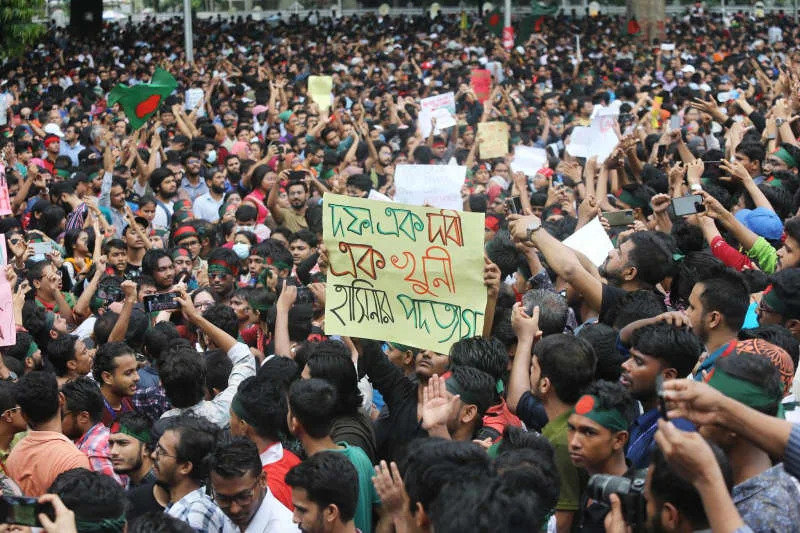
Anti-Discrimination Student Movement take part in a rally at Central Shaheed Minar to demand justice for the victims killed in the recent countrywide anti-quota protests. Habibur Rahman/ZUMA Press Wire/dpa
Tens of thousands of people took to the streets again on Saturday in Bangladesh to demand resignation of Prime Minister Sheikh Hasina’s government.
“We have reached a one-point demand for the resignation of the government of Sheikh Hasina to ensure human safety and establish social justice,” Nahid Islam, one of the coordinators of the Anti-Discrimination Student Movement, announced before a crowd of several thousand protesters in Dhaka.
“We will enforce all-out non-cooperation actions across Bangladesh from Sunday,” he said.
The announcement came hours after Prime Minister Hasina called upon the agitating students to sit down with her to put on an end to violence.
“I want to listen to the students as most of their demands have been met. I want no conflict,” Hasina told a meeting with leaders from different professional groups at her heavily guarded official Gababhaban residence in Dhaka.
She said her government has launched a judicial inquiry into the violence to find out the culprits involved in the killings and acts of sabotage.
“Anyone found guilty will be brought to book,” she added.
Last month's protests seemed to have calmed down somewhat, but flared up again on Friday to demand justice for the victims of the killings.
On Saturday, footage showed the protesters carrying placards inscribed with anti-government slogans blocking intersections in the capital Dhaka and putting barricades on highways in the other districts outside the capital.
They demanded Hasina step down, taking responsibility for the “mass killing and other atrocities by the police on peaceful demonstrations."
The protesters in their thousands gathered centrally near the Dhaka University campus.
Similar agitations were reported from other parts of the country.
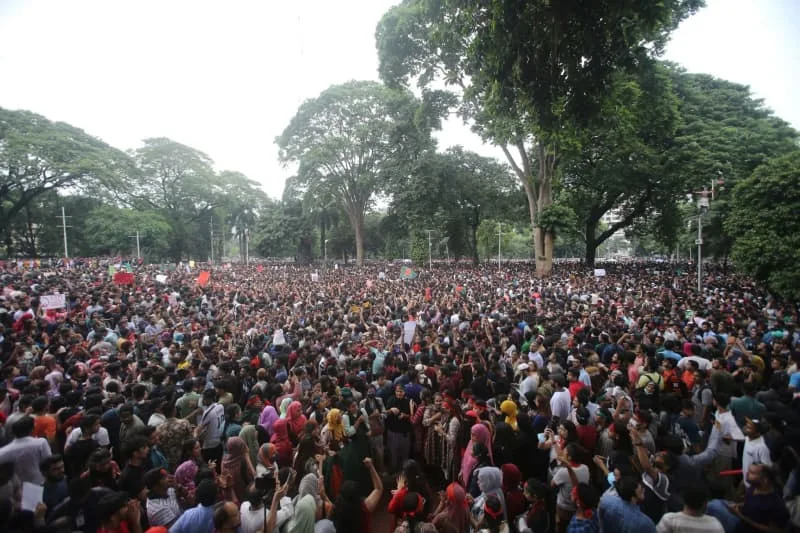
Anti-Discrimination Student Movement take part in a rally at Central Shaheed Minar to demand justice for the victims killed in the recent countrywide anti-quota protests. Habibur Rahman/ZUMA Press Wire/dpa
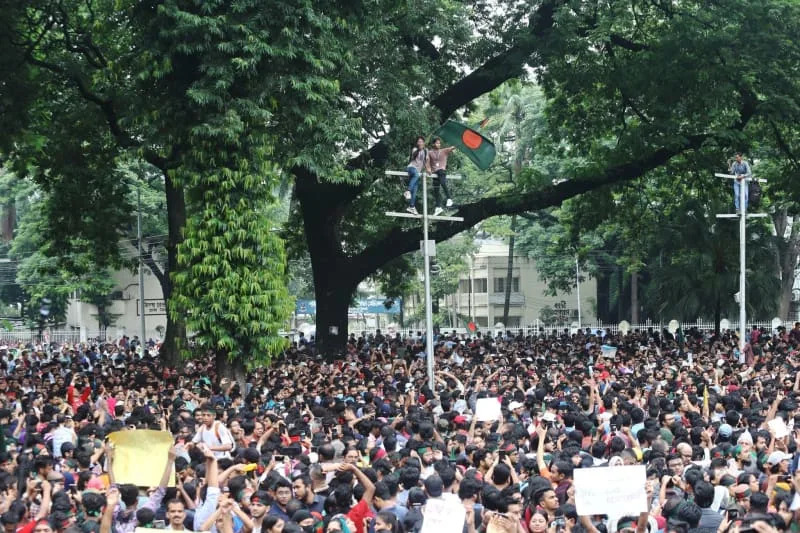
Anti-Discrimination Student Movement take part in a rally at Central Shaheed Minar to demand justice for the victims killed in the recent countrywide anti-quota protests. Habibur Rahman/ZUMA Press Wire/dpa
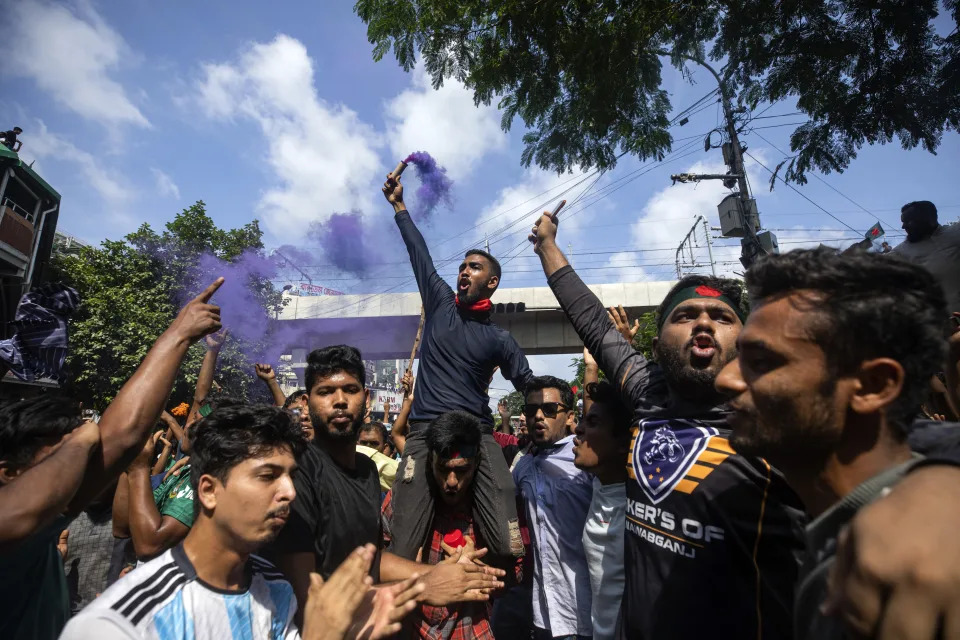
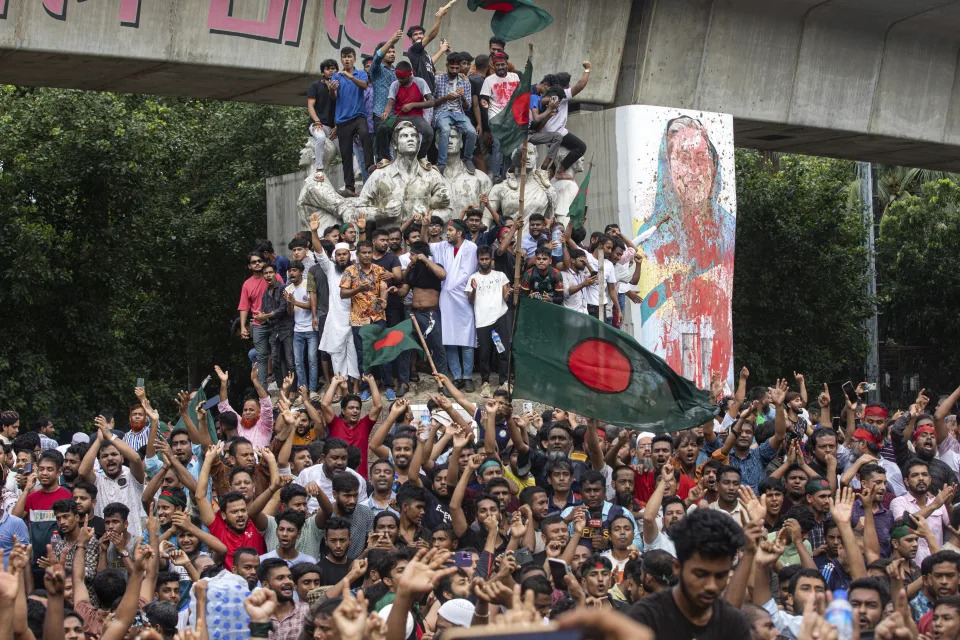


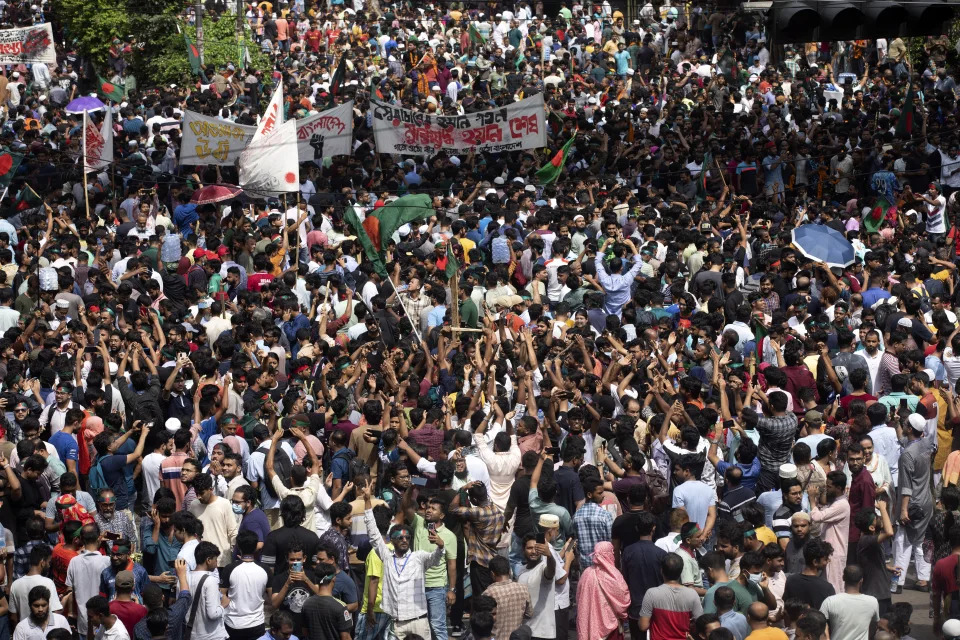

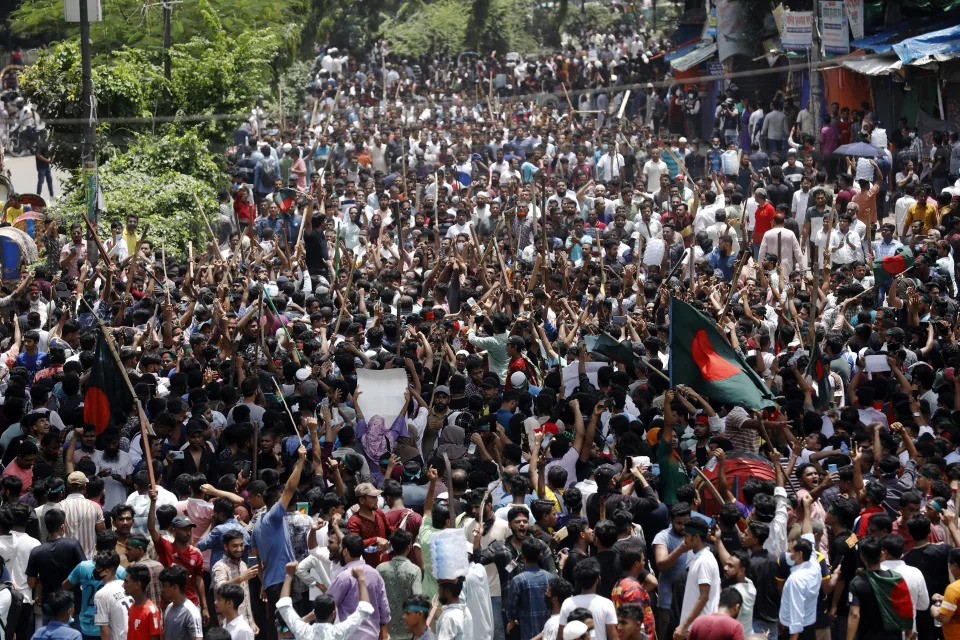
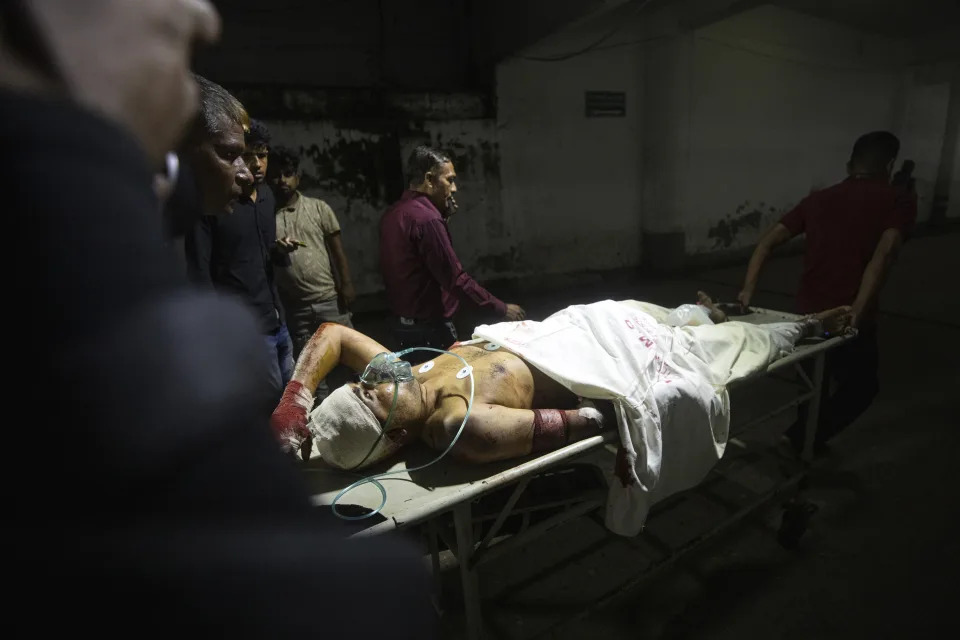
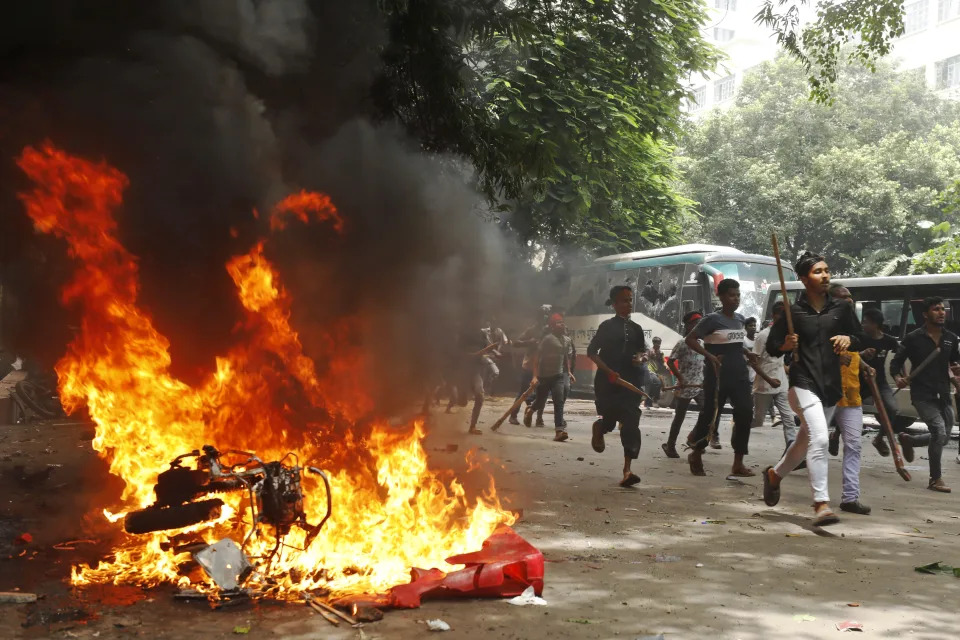


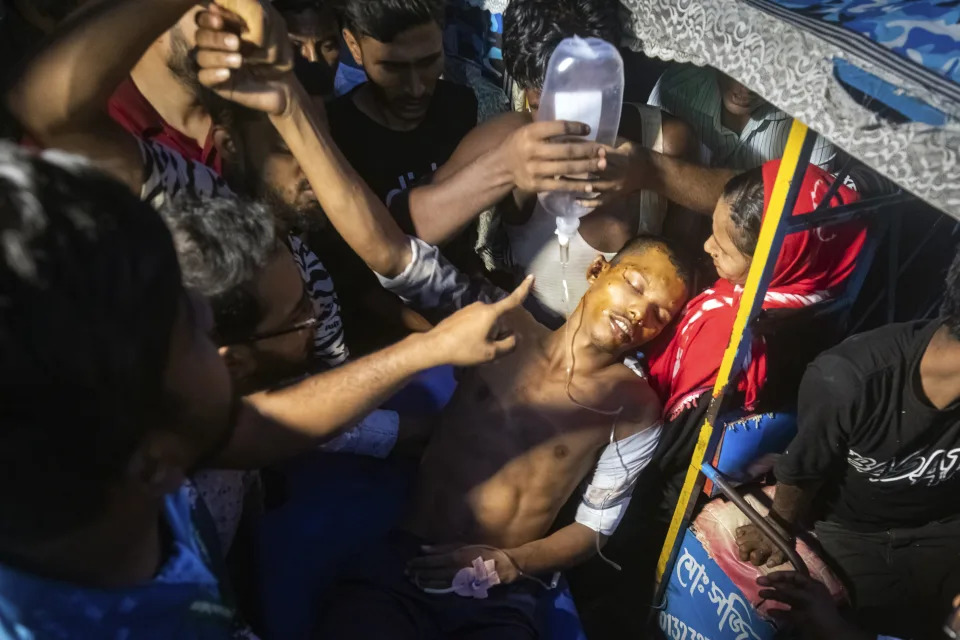
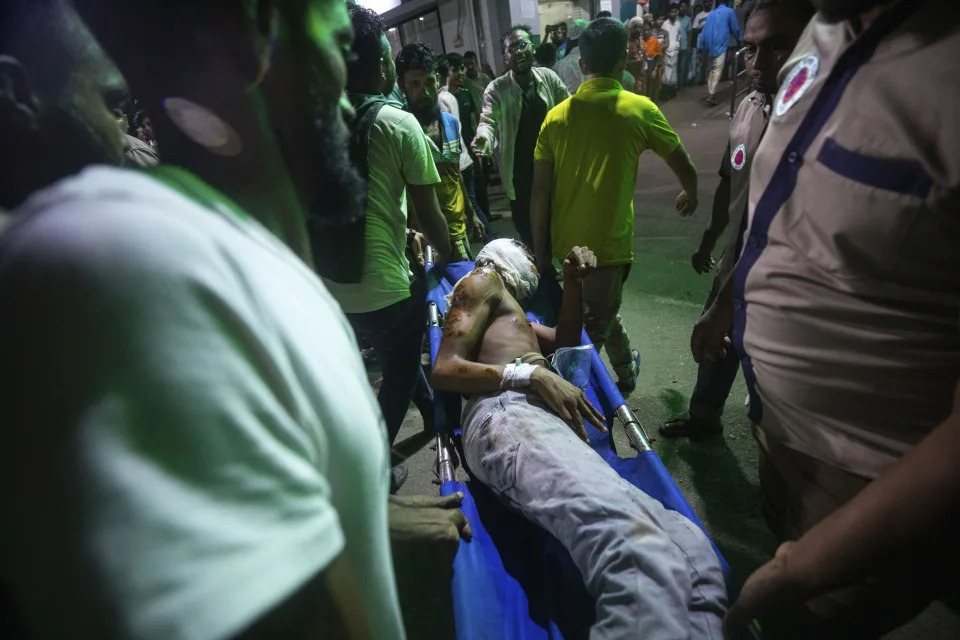

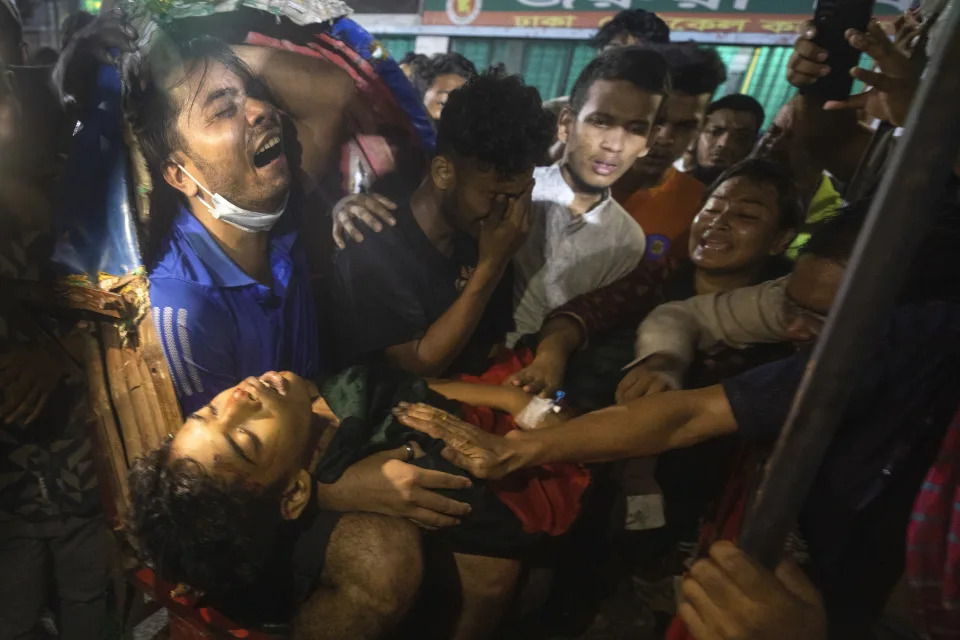
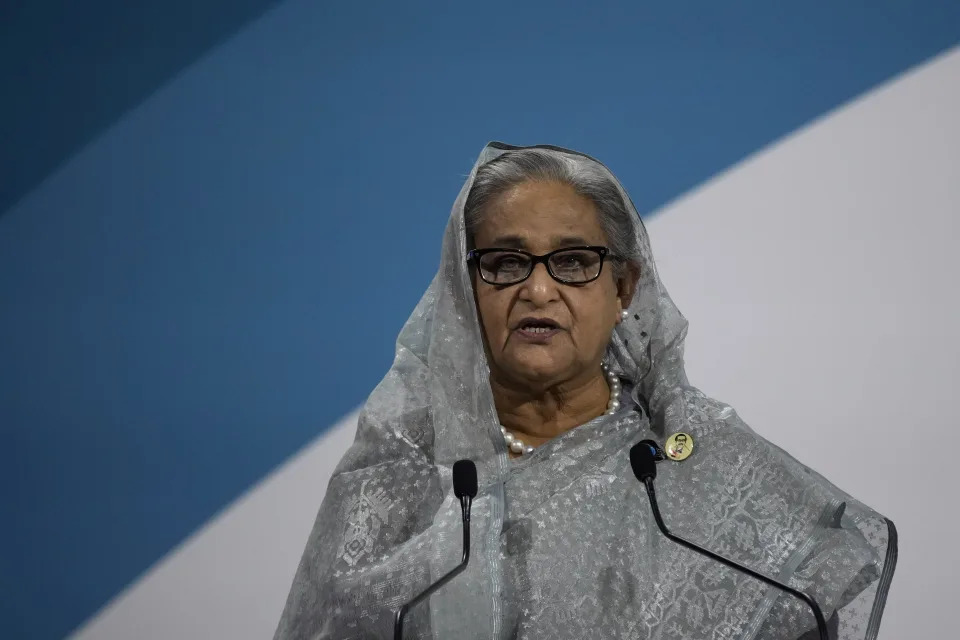



People shout slogans as they take part in a protest against Prime Minister Sheikh Hasina and her government demanding justice for the victims killed in the recent countrywide deadly clashes, in Dhaka, Bangladesh, Monday, Aug. 5, 2024. (AP Photo/Rajib Dhar)
